Berkeleyan
Coming soon, to a monitor near you
Provocative questions, pointed responses at I-House forum convened to mark IIS’s 50th anniversary
![]()
09 February 2005
Last Thursday, at the invitation of the Institute of International Studies (IIS), seven foreign-policy experts convened at International House to celebrate the institute’s 50th anniversary by lending their expertise and opinions to a panel titled “Foreign Policy in a New Global Era.” Moderated by IIS director Steven Weber, the panel tackled thorny questions on nuclear proliferation, America’s shrinking stockpile of global goodwill (and how — or if — it can be replenished), the role of transnational governing organizations, and competition for natural resources, among other topics.
Some of the flavor of that exchange is offered here. For the full banquet, view the webcast of their discussion at webcast.berkeley.edu/events, available starting Monday, Feb. 14.
And if you crave further opinions on foreign affairs, there is a growing range of them — from students, staff, and alumni — showing up daily on the campus NewsCenter, in response to a recently posted question about the extent to which Iraq’s elections may have changed people’s opinion about the war. Check out “Point of View” at www.berkeley.edu/news/media/releases/2005/02/03_pov.shtml.
 |
Steven Weber, director of the
Institute of International Studies and professor of political science
Weber cited a BBC Europe poll conducted after President Bush’s re-election,
which reported that only 38 percent of respondents saw U.S. influence
as positive: “So what? Does it matter for our foreign policy? The
mainstream story is that ‘We squandered all our global goodwill after
9/11. It could have been sustained, but we blew it on that Iraq thing.’ Is
that true? Does it matter? Should we care?” |
Yuen Foong Khong, Faculty Fellow at Oxford University’s Nuffield College
“The perception used to be that the U.S. took international law seriously. It consulted with its allies. It cared about moderation, it was able to restrain itself in all those multilateral institutions in order to make the exercise of its power more acceptable.” But the pre-emptive strike against Iraq and the Abu Ghraib prison scandal, along with the United States’ perceived favoritism in the Israel-Palestine conflict, have seriously eroded that support, Khong said. |
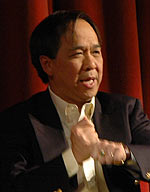 |
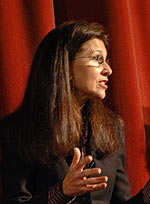 |
Jane Wales, president and CEO of the World Affairs Council of Northern California
America is being redefined in the eyes of the world as “united against a common enemy [terrorism] rather than united in a common commitment to the rule of law, to the shared values on which this country was founded.”
|
| Joel Rosenthal, president of the Carnegie Council on Ethics and International Affairs
In response to Wales’ proposal that America issue a statement of its purpose, reiterating what “we have stood for, what we have championed,” Rosenthal said what the United States says, not just what it does, will be important going forward. The next few years could provide the “opportunity to reorganize, a chance to set some rules, some norms, and some ethics by which we declare we will behave.”
|
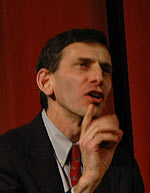 |
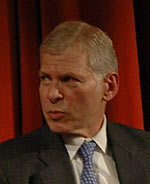 |
Leon Fuerth, Professor of International Affairs at George Washington University
“
I don’t understand a discussion that treats the current administration as if it were wax to be molded. They’re going to go their own way. What exactly is the point of talking about how the United States should behave, when we are represented by a government that doesn’t care what we think?”
|
| Bruce Jentleson, director of the Terry Sanford Institute of Public Policy and chair of
Duke University’s Department of Public Policy Studies
“If you don’t have power that you can convert to influence, then you really can’t get the things done that you want to get done. And there are very few problems that even we, as the most powerful country in the world, can solve on our own.”
|
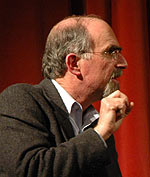 |
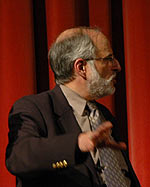 |
Jonathan Pollack, director of the
Strategic Research Department and the Asia-Pacific Studies Group of the
Naval War College
“
This is not an administration that is going to let people see them sweat
too much. The reality is that they are wounded and they know it.” Bonnie Azab Powell photos |

